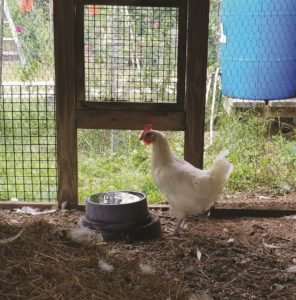EASTHAM — The board of health voted on July 29 to adopt a new set of noncommercial farm animal regulations. The rules require households to apply for permits to keep “any animal which is not commonly kept as a household pet and which is normally and has historically been kept and raised on farms in the United States.” They go into effect on Jan. 1, 2022.
According to the board’s definition, farm animals include, but aren’t limited to, alpacas, cows, ducks, emus, geese, goats, horses, sheep, pigs, llamas, ostriches, rabbits, turkeys, and chickens. The rules note that “noncommercial” means the sale of these animals or their products, such as wool or eggs, must be incidental to the principal use of the property. In other words, the products are meant primarily for the household
A permit will not be required for three or fewer rabbits or a total of three or fewer chickens and ducks. The draft regulations posted for the hearing had a higher exemption number: 10 or fewer total chickens and ducks. It was lowered to three ducks and chickens during the hearing.

“We went back and forth many times,” said Joanna Buffington, chair of the board of health, of the fowl figure. “One of the issues clearly is the workload and how many people have chickens and being able to process permits.”
Eastham and Wellfleet animal control officer Desmond Keough encouraged the board to require permits for four or more chickens or ducks — which is the rule in Wellfleet. “Anything above that is where you get into the health issues,” said Keough.
“I’ve gone to ones where they have 10,” he said, “and if it is neglected, when I pull in the driveway, I can smell it right away. I wouldn’t want to be living next door.”
Eastham resident Sadie Hill, who keeps chickens, said by phone on Aug. 2 that she would favor a permit requirement for anyone keeping any number of rabbits, chickens, or ducks. “If you want animals to be raised humanely — and that’s the whole point of it,” she said, “you want to have a clean coop and be sure everything’s set up correctly and you have enough space.”
Ron Sassi of Barquentine Court told the board that a rat infestation on his property was caused by a neighbor’s failure to clean a chicken coop properly. “I don’t want someone to go through what I’m going through,” said Sassi.
“I’m familiar with your property,” said Keough. “The inspections stop situations like that from happening. The inspections will keep it clean, so you’re not going to have rat infestation problems.”
According to the regulations, noncommercial farm animals may be permitted on lots with a minimum of 20,000 square feet of buildable upland (30,000 square feet for horses and cows), “except in zoning districts where such uses are prohibited,” and subject to other requirements, as well as state and local laws and regulations.
The regulations seem to provide leeway for current animal owners. Persons keeping animals before the effective date of the rules “may continue to do so for the life of the animals,” but only if a permit is applied for within 30 days of the effective date. And those already keeping animals will still need to comply with the basic requirements of general care, submit an approved animal care plan, and “have maximum feasible compliance” with the other provisions of the new rules.
Eastham Director of Health and Environment Jane Crowley said permit applications would be available online by Oct. 1. The board recommended that no fees be charged for the first year.
While unable to say how the select board would vote on the permit fees, select board vice chair Aimee Eckman said on Aug. 2 it wasn’t unusual for fees to be waived the first year.
“That’s pretty common, particularly with a new fee,” she said.



